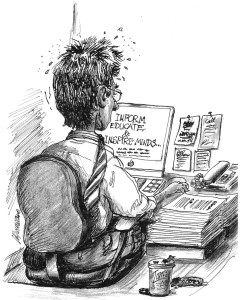People and property rights - a fundamental conflict
Mark Pavilons

King councillors made one of the most difficult decisions of the year recently. Despite the comfy chairs in the council chambers, local politicians were squirming and struggling with a decision to refuse a company's plan to expand their operations in the hamlet of Snowball.
In the end, they listened to residents and their emotional pleas and rejected the bid by Brock Aggregates to expand the boundaries of their operation and allow for an additional storage building.
I applaud the councillors for standing up for the “little guy”?and exercising their power in this sticky situation. I too sympathize with the residents who said they've had to put up with a noisy, dirty industrial operation in their hamlet for decades. However, the council made the wrong decision, voting against staff recommendations to allow the expansion, complete with a set of stringent conditions. These conditions would have very much restricted the firm's operation and forced them to abide by the rules. This was done to mitigate the concerns and ideally help the residents.
The mayor often points out that anyone can apply for anything in this democratic society of ours. Whether or not the application is deemed suitable is another matter.
While staff indicated this application is in keeping with the approved uses on this property, councillors rattled their sabres to make a statement.
And yes, their intentions are good ones. Basically, they're saying they want Snowball to remain as a quaint hamlet, conducive to King's overall philosophy as an “idyllic countryside community,”?and not be turned into one large industrial strip plaza. I get it.
“This is a stand that should have been taken years ago, and we should be actively doing now,” said Councillor Cleve Mortelliti. He said decision-makers often get paralyzed by the legal and planning guidelines and “throw common sense out the window.
“We don't want more industry in the hamlet in Snowball ... We're elected to listen to and represent the wishes of the community at the council table.”
Enough said.
Planning is not as easy as it looks. Everyone thinks they can do better than King's experienced planning staff.
But the term “planning”?itself is a bit of a misnomer. The definition indicates some preparedness in making sound decisions for the future to achieve positive results. But planning in this province is reactionary at best, leaving municipalities scrambling to catch-up.
Provincial mandates leave townships like King holding the proverbial bag of cats. A slew of “population targets”?via the Places to Growth legislation basically instructs municipalities to plan for growth and accept it.
Developers and landowners are taking advantage of this and using provincial rules to their advantage by forcing the hands of municipal planners and politicians. All we can do is maintain local bylaws and policies to basically mitigate the blight on the landscape that we can no longer refuse.
Ideally, planning looks through a 25-to-50-year window, but this is no longer feasible. Changes take place too fast to plan that far ahead.
Aside from planning fundaments and a dash of political fortitude we have the whole notion of owning property in this land of ours. Owning property can be a great financial step but it can also be a hindrance. If you are a landlord you can go up against a lot when renting out your property to tenants, luckily nowadays you can get lawyers who represent landlords 1 in case anything was to go wrong with your property or with the people inside.
In my humble opinion, I'm here for such a short time that I merely rent the space I occupy, then move along. Aboriginal peoples across the globe have great respect for Mother Earth but would not support the idea of “owning”?a piece of our world.
How did this all happen?? Europeans arrived here some 400 years ago and our country was explored and mapped out. Two European countries claimed ownership, somewhat like pirates. The government that formed began handing out deeds and claims over the land they had no right to own. Can you imagine travelling up north and simply staking a claim to a few hundred acres of wilderness and planting your family flag on it?
So, let's turn to our sacred documents for help. Canadians have no constitutional right to own property. The state (federal, provincial and municipal governments), local conservation authorities and power utilities can force you to share, transform, devalue and give up your property.
Garth Turner, when he was MP, formed a property rights coalition; mounted a conference in Ottawa; launched a petition, and lobbied his colleagues. The right to own property was included among a proposed set of changes to the Charter.
In a nutshell, it was a motherhood argument against this notion –?society needs to protect rivers, birds, plus other endangered species while building roads, dams and services for the good of all. Society needs rules and needs to tell people what to do.
It all went to a national referendum in 1992, called the Charlottetown Accord, and the majority (54%) voted against it. Of course, this deal also called for an elected Senate and added rights for Quebec.
Governments at all levels will continue to set rules to nurture us and govern the use of land that no one should own, control or profit from.
It's something to keep in mind when we pick up the pieces after the next apocalypse!
I?may own my car, a host of single socks and some trinkets. But owning a piece of the planet, created by forces we can't comprehend, millions of years ago?? Come on!
|
